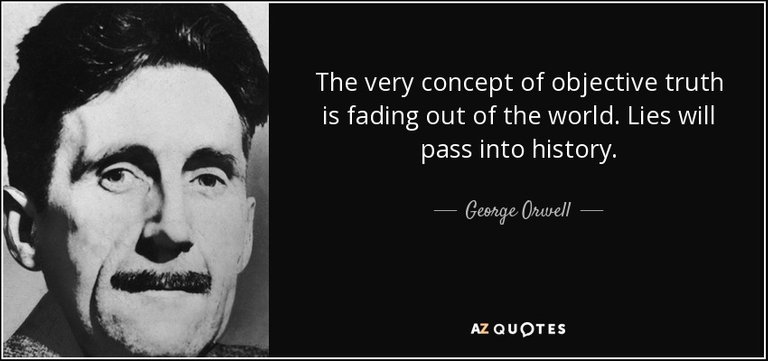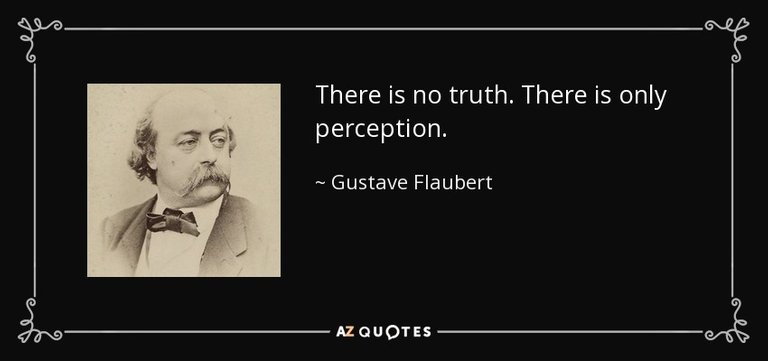"There is no truth. There is only perception." - Gustave Flaubert
Debating Relativism and the Social Construction of Truth
.

Disclaimer: Please note that I am not a trained epistemological philosopher. I am just a guy who likes to read trying to come to terms with an increasingly irrational public discourse based on what appears to be hyper-relativism, i.e. the absolute denial of objective truths. Even when not explicitly stated, all of the following arguments should be silently predicated by the statement "In my experience..."
"There is no truth but that which we agree upon."
.
The increasingly dominant trend of claiming that truth is what we agree it is has set the stage for a complete restructuring of society by opinion makers and demagogues. It used to be, in my time at university, that it was primarily philosophy students who entertained the idea of truth being a social construct. When having discussions with them, attempts to address issues of 'truth' or discuss things in term of 'true' or 'false' would frequently be met with the tired relativist refrain of "But what is truth?"
Since then, this line of argumentation seems to have been adopted in earnest by almost the entirety of the liberal arts and sciences. Recently, I was astounded to hear exactly this phrase, "What is truth?" used as the parting salvo by a social justice pundit in a televised debate. It was thrown in at the very end of the debate as a final refutation to a statement that went something like "That just isn't true". It reminded me of the countless similar conversations I had during my years at university with the adherents to Critical Theory and the fields of study that have embraced it (almost all liberal arts and sciences at this point).
My experience debating academically trained relativists
.
Having been exposed to this peculiar postmodernist consensus-based epistemological approach and its attendant argumentation in the social sciences, there are a number of points I would like to convey that may be helpful in the event you find yourself involved in a discussion with someone versed in relativist debate tactics.
"What is truth?"
.
Firstly, it is very easy to become completely sidetracked from the topic at hand when a relativist decides to inject an epistemological debate into the middle of a conversation. This will, in my experience, typically occur when the discussion is not preceding in accordance with the relativist's world view and when something is described as 'true' that runs counter to subjective truths the relativist adheres to. The form of this epistemological injection will almost inevitably be given voice in the form "What is truth?"
Once the question "What is truth?" is introduced, people not schooled in postmodernism tend to opt for a common sense approach based on Correspondence Theory (or perhaps Coherence Theory), basically, that 'truth' or something that is 'true' corresponds to an objectively measurable, quantifiable, empirically demonstrable state capable of being or, more generally, facts. (See the Wikipedia article on 'Truth' for a decent overview.) This is low hanging fruit by a relativist's standards.
"You can't know anything. You can only believe to know."
.

The most common pendant to this will be to counter with an overly simplified and cherry-picked tenet of constructivist epistemology that contends mankind's ability to 'know' anything is the result of socio-biological phenomena (i.e. knowledge is a social construction predicated by our biology). The argument will then be advanced that the best mankind can hope for is _ to believe to know_, which is not knowing at all, but believing. This is the first critical step to rationalizing relativism as a reasonable world view.
Once you have accepted this postulate, as I made the mistake of doing many times, any subsequent arguments become relativized in so far as everything must be predicated by the abstraction of "I believe to know that I believe to know..." repeated to infinity. This will derail any attempts to arrive at an objective truth, indeed, it appears to negate humanity's ability to recognize objective truths at all, thus lending a kind of pragmatic justification to embracing socially constructed truths. It is easy to fall into this trap, because this form of relativism does exercise its own infernal... I mean, internal logic.
Losing the Debate
.
Once this stage has been reached, it is time to start discussing the Flying Spaghetti Monster for all the good the conversation will do you, unless your only goal is to reach the consensus that everybody can believe whatever they want, because none of us can really know anything. The irony at that late stage of the game is that even in reaching consensus, you will not be allowed to know you have reached a consensus, you will only be able to believe it...
This intentional (though oft-times unintentionally parroted) tactic by trained relativists is designed to redirect the onus of proof to the postulator of the ability to 'know' anything, which is the necessary condition for being able to describe anything as objectively 'true'. It is a stunningly effective rhetorical sleight of hand. But a sleight of hand it is. The real question should be "Is it possible to disprove that I am capable of 'knowing'?"
The Scientific Method to the Rescue
.

And this last point is telling. The most reliable proof in the scientific method is not based on the ability to prove a model, but the inability to disprove it. I have yet to meet a relativist who can disprove the ability of mankind to recognize objective truths, which is why the rhetorical tactic of "you don't know, you believe to know" will be liberally and generously applied any time the "logic" of their line of reasoning is threatened.
Inevitably any debate with a relativist becomes an epistemological one that you have lost as soon as you acquiesce to "believing to know" rather than demanding they disprove a person's ability to know objective truths. Unless it is possible to disprove that the human organism is capable of recognizing objective truths (its biological fallibilities notwithstanding), the entire edifice of relativism (and all of its derived academic forms of pseudo-intellectualism) may legitimately be considered purely speculative, i.e. non-practical, fields of endeavor.
The Complicity of the Universities
.
And this brings us back to the university itself. The fields of study producing the most relativists (language arts, history, queer studies, social justice studies etc.) are largely taught by people that have never been educated in the scientific method, formal logic or the intricacies of the philosophical models they cherry-pick ideas from. And the poisoned wellspring from which the cherry tree has blossomed is the neo-Marxist school of Critical Theory (see my article: Frankenstein's Monster for more).
This amateur dabbling, in light of the current state of affairs on campuses across the country, seems to have contributed to an increase in irrational behavior and the rise of an exceedingly vocal, anti-science, anti-intellectual subculture of self-victimizing virtue signalers who openly advocate violence and the dissolution of civil society based on their subjective truths. Worse yet, as the political debate I referenced at the beginning demonstrates, they have begun weaving their ideas into the broader social and political fabric of the nation.
Conclusion
.
So, in the future, whenever you are faced with debating a relativist and the attendant contention that we can't actually know anything, I hope this brief outline may be of assistance. Fortunately, most relativists are not well versed in the topic beyond the obligatory belief that "the truth is what we believe it is". Unfortunately, the more adroit adepts of this postmodern perspective are primarily ensconced in the universities and busy propagating the ideology. But should you encounter one and they insist on a debate, simply ask if they have anything more substantial to offer than relativism, if not, suggest discussing the Flying Spaghetti Monster instead.
.


.
.
.
Shot with a golden arrow,

.
.
.
Don't forget to upvote, follow and resteem! Comments always appreciated.
.
If you want an update via reply for when I post a new contributions, please note so in the comments.
If you are like me, my feed is flooded so I sometimes overlook something I have been waiting for.
.
.
.
All gifs courtesy of Giphy
Flaubert image source
Orwell image source
Jefferson image source
Nicely done; I have dome some posting on Truth; objective vs subjective, the perception of, etc.
If I do an index of these posts, I'll include this one!
The other thing to note about the relativist is that Truth becomes "objective" for them really quickly when they are trying to jam a disastrous social poloicy down the public's throat
Thanks for your comment. Yes, mastery of the double standard takes a remarkably relativist perspective sometimes. The disastrous policies currently being advocating (and that are in place) are rationalized by any means necessary, if an objective truth happens to be convenient, it will be employed! How's that quote go, "Lie, damn lies, and statistics" ... ah, the bread and butter of public policy debates...
There are facts and there are the interpretation of those facts.
By that I mean facts are observations. If those observations occur during an experiment they can be replicated by anyone with the facilities to do so.
Conclusions drawn from those facts is a whole nuther elephant..
Very true, and it is where drawing the conclusions and deciding on a course of action comes in that the relativist really shines.
Another excellent post! You have a vast array of interesting topics to write about. I'm curious what area your formal education is in and I'm curious about what formed your thinking. Was this highly influenced by your family or religious practice or did you develop it from your education and experience at a university?
Some years ago, I turned on the radio to an interesting discussion about the danger of relativism. The gist was that God is not relative but absolute. I think if people could accept this and stop trying to convince themselves they are greater/better than someone else who has lower moral standards, we could actually slow down the degradation of our society. We always find some way to rationalize and justify our behavior relatively.
upvoted. resteemed.
This might be of interest you in relation to this topic from 5 months ago.
Truth vs Fact and Dynamic vs Static within Belief Systems
Excellent, thanks, will take a look at it.
Thanks for this! As a Libertarian-turned-Voluntaryist, I get the importance of objectivism. Where I sometimes struggle is in helping people learning NVC to understand the difference between accepting peoples' perception of reality vs condoning their perspective. Where I seem to get the most understanding is when I share that NVC is more concerned with understanding other peoples' perspectives than about determining if their perspective is right or wrong or any other form of evaluation. Thanks for prompting me to think more on this. I'd be super happy to hear any ideas you have about what I just said.
Nonviolent communication strategies are something the current divided political climate could definitely benefit from. Your approach of explaining it is about understanding perspectives, not judging them, is a good one. Accepting vs condoning is also a good contrast to draw, and a necessary one in a society where a plurality of voices and views is the ideal. Today however, it appears compassion is in short supply. This makes me think of Tucker Carlson, who is a pretty good interviewer who leans right, and the interviews he conducts. He (at least superficially) seems to embrace the distinction between accepting and condoning at least sometimes, but it is amazing how so many of his guests just don't seem to be able to make that distinction. You too have given me food for thought. Thanks for the comment!
:-)
I am shocked to discover that those who purport to study philosophy can be so casually dismissive of objective truth! If there is no objective truth, then these "philosophers" expend hours performing mental masturbation in their classes and theses. What a waste of human life . . .
That is one of the best formulations of the problem I have read to date. And yes, having sat in some of the seminars where this was en vogue, the objective was not to love wisdom, but to be loved for virtue-signaling while pretending to pursue truth.
This post received a 5.0% upvote from @randowhale thanks to @cupidzero! For more information, click here!
This post has received a 2.07 % upvote from @buildawhale thanks to: @cupidzero. Send 0.100 or more SBD to @buildawhale with a post link in the memo field to bid on the next vote.
To support our curation initiative, please vote on my owner, @themarkymark, as a Steem Witness
Good piece.
Thank you!
Another look at this question:
https://steemit.com/truth/@stevescoins/revisiting-the-blind-men-and-the-elephant-objective-truth-versus-subjective-truth
Hi I am inviting You,
I nominated Your post for the #minnowsfaucet community
You can post the link to your article here
https://steemit.com/minnowsfaucet/@nicnicy/minnowsfaucet-community-ping-pong-aug-18
I read that through and have to work it through in my head. Definitely thinking about it. You really think this my best post? I had hoped it might be The Edge of Dreams / The Neoplatonic Pirate ;).
Both are excellent. You'll have to decide which one to put forward. I think this one is so immediate and on point with what's happening now that it is somewhat more accessible to the average reader. This is just a way to give minnows more exposure to different subcommunities within the larger Steemit community.
I have wanted to learn formal logic for ages, simply in order to debate people like this.
If you're interested, take a gander at the following links. They are self-paced and free. I personally took two semesters of symbolic logic and a few courses in the scientific method, but keeping everything in your head while in a debate is a real challenge to be honest. I prefer writing when possible :P
Symbolic Logic: A Free Online Course he finally gets rolling pretty good at 22:00:
Lofic & Proofs
I might just run through these to refresh, it has been forever since I did a truth tree. Don't get weirded out by the formulae, they're easier than they look when you see them the first time.
Okay, I'll do my best. I once tried to read Kierkegaard and got completely lost in the sentences.
Thank you. I find it rather the subject somewhat intimidating so I thought I'd do better in person. I'll try this, though.
I am steeped in the scientific method. I did three years of a Ph.D. in Linguistics and my parents are academics. But I never studied formal logic or debate, both of which I'd like to have under my belt.